- Home
- George Orwell
Essays Page 27
Essays Read online
Page 27
We cannot look to this or to any similar government to put through the necessary changes of its own accord. The initiative will have to come from below. That means that there will have to arise something that has never existed in England, a Socialist movement that actually has the mass of the people behind it. But one must start by recognizing why it is that English Socialism has failed.
In England there is only one Socialist party that has ever seriously mattered, the Labour Party. It has never been able to achieve any major change, because except in purely domestic matters it has never possessed a genuinely independent policy. It was and is primarily a party of the trade unions, devoted to raising wages and improving working conditions. This meant that all through the critical years it was directly interested in the prosperity of British capitalism. In particular it was interested in the maintenance of the British Empire, for the wealth of England was drawn largely from Asia and Africa. The standard of living of the trade-union workers, whom the Labour Party represented, depended indirectly on the sweating of Indian coolies. At the same time the Labour Party was a Socialist party, using Socialist phraseology, thinking in terms of an old-fashioned anti-imperialism and more or less pledged to make restitution to the coloured races. It had to stand for the ‘independence’ of India, just as it had to stand for disarmament and ‘progress’ generally. Nevertheless everyone was aware that this was nonsense. In the age of the tank and the bombing plane, backward agricultural countries like India and the African colonies can no more be independent than can a cat or a dog. Had any Labour government come into office with a clear majority and then proceeded to grant India anything that could truly be called independence, India would simply have been absorbed by Japan, or divided between Japan and Russia.
To a Labour government in power, three imperial policies would have been open. One was to continue administering the Empire exactly as before, which meant dropping all pretensions to Socialism. Another was to set the subject peoples ‘free’, which meant in practice handing them over to Japan, Italy and other predatory powers, and incidently causing a catastrophic drop in the British standard of living. The third was to develop a positive imperial policy, and aim at transforming the Empire into a federation of Socialist states, like a looser and freer version of the Union of Soviet Republics. But the Labour Party’s history and background made this impossible. It was a party of the trade unions, hopelessly parochial in outlook, with little interest in imperial affairs and no contacts among the men who actually held the Empire together. It would have had to hand the administration of India and Africa and the whole job of imperial defence to men drawn from a different class and traditionally hostile to Socialism. Overshadowing everything was the doubt whether a Labour government which meant business could make itself obeyed. For all the size of its following, the Labour Party had no footing in the navy, little or none in the army or air force, none whatever in the Colonial Services, and not even a sure footing in the Home Civil Service. In England its position was strong but not unchallengeable, and outside England all the points were in the hands of its enemies. Once in power, the same dilemma would always have faced it: carry out your promises, and risk revolt, or continue with the same policy as the Conservatives, and stop talking about Socialism. The Labour leaders never found a solution, and from 1935 onwards it was very doubtful whether they had any wish to take office. They had degenerated into a Permanent Opposition.
Outside the Labour Party there existed several extremist parties, of whom the Communists were the strongest. The Communists had considerable influence in the Labour Party in the years 1920–26 and 1935–9. Their chief importance, and that of the whole left wing of the Labour movement, was the part they played in alienating the middle classes from Socialism.
The history of the past seven years has made it perfectly clear that Communism has no chance in western Europe. The appeal of Fascism is enormously greater. In one country after another the Communists have been rooted out by their more up-to-date enemies, the Nazis. In the English-speaking countries they never had a serious footing. The creed they were spreading could appeal only to a rather rare type of person, found chiefly in the middle-class intelligentsia, the type who has ceased to love his own country but still feels the need of patriotism, and therefore develops patriotic sentiments towards Russia. By 1940, after working for twenty years and spending a great deal of money, the British Communists had barely 20,000 members, actually a smaller number than they had started out with in 1920. The other Marxist parties were of even less importance. They had not the Russian money and prestige behind them, and even more than the Communists they were tied to the nineteenth-century doctrine of the class war. They continued year after year to preach this out-of-date gospel, and never drew any inference from the fact that it got them no followers.
Nor did any strong native Fascist movement grow up. Material conditions were not bad enough, and no leader who could be taken seriously was forthcoming. One would have had to look a long time to find a man more barren of ideas than Sir Oswald Mosley. He was as hollow as a jug. Even the elementary fact that Fascism must not offend national sentiment had escaped him. His entire movement was imitated slavishly from abroad, the uniform and the party programme from Italy and the salute from Germany, with the Jew-baiting tacked on as an afterthought, Mosley having actually started his movement with Jews among his most prominent followers. A man of the stamp of Bottomley or Lloyd George could perhaps have brought a real British Fascist movement into existence. But such leaders only appear when the psychological need for them exists.
After twenty years of stagnation and unemployment, the entire English Socialist movement was unable to produce a version of Socialism which the mass of the people could even find desirable. The Labour Party stood for a timid reformism, the Marxists were looking at the modern world through nineteenth-century spectacles. Both ignored agriculture and imperial problems, and both antagonized the middle classes. The suffocating stupidity of left-wing propaganda had frightened away whole classes of necessary people, factory managers, airmen, naval officers, farmers, white-collar workers, shopkeepers, policemen. All of these people had been taught to think of Socialism as something which menaced their livelihood, or as something seditious, alien, ‘anti-British’ as they would have called it. Only the intellectuals, the least useful section of the middle-class, gravitated towards the movement.
A Socialist Party which genuinely wished to achieve anything would have started by facing several facts which to this day are considered unmentionable in left-wing circles. It would have recognized that England is more united than most countries, that the British workers have a great deal to lose besides their chains, and that the differences in outlook and habits between class and class are rapidly diminishing. In general, it would have recognized that the old-fashioned ‘proletarian revolution’ is an impossibility. But all through the between-war years no Socialist programme that was both revolutionary and workable ever appeared; basically, no doubt, because no one genuinely wanted any major change to happen. The Labour leaders wanted to go on and on, drawing their salaries and periodically swapping jobs with the Conservatives. The Communists wanted to go on and on, suffering a comfortable martyrdom, meeting with endless defeats and afterwards putting the blame on other people. The left-wing intelligentsia wanted to go on and on, sniggering at the Blimps, sapping away at middle-class morale, but still keeping their favoured position as hangers-on of the dividend-drawers. Labour Party politics had become a variant of Conservatism, ‘revolutionary’ politics had become a game of make-believe.
Now, however, the circumstances have changed, the drowsy years have ended. Being a Socialist no longer means kicking theoretically against a system which in practice you are fairly well satisfied with. This time our predicament is real. It is ‘the Philistines be upon thee, Samson’. We have got to make our words take physical shape, or perish. We know very well that with its present social structure England cannot survive, and we have got to make ot
her people see that fact and act upon it. We cannot win the war without introducing Socialism, nor establish Socialism without winning the war. At such a time it is possible, as it was not in the peaceful years, to be both revolutionary and realistic. A Socialist movement which can swing the mass of the people behind it, drive the pro-Fascists out of positions of control, wipe out the grosser injustices and let the working class see that they have something to fight for, win over the middle classes instead of antagonizing them, produce a workable imperial policy instead of a mixture of humbug and Utopianism, bring patriotism and intelligence into partnership – for the first time, a movement of such a kind becomes possible.
II
The fact that we are at war has turned Socialism from a text-book word into a realizable policy.
The inefficiency of private capitalism has been proved all over Europe. Its injustice has been proved in the East End of London. Patriotism, against which the Socialists fought so long, has become a tremendous lever in their hands. People who at any other time would cling like glue to their miserable scraps of privilege, will surrender them fast enough when their country is in danger. War is the greatest of all agents of change. It speeds up all processes, wipes out minor distinctions, brings realities to the surface. Above all, war brings it home to the individual. That he is not altogether an individual. It is only because they are aware of this that men will die on the field of battle. At this moment it is not so much a question of surrendering leisure, comfort, economic liberty, social prestige. There are very few people in England who really want to see their country conquered by Germany. If it can be made clear that defeating Hitler means wiping out class privilege, the great mass of middling people, the £6 a week to £2,000 a year class, will probably be on our side. These people are quite indispensable, because they include most of the technical experts. Obviously the snobbishness and political ignorance of people like airmen and naval officers will be a very great difficulty. But without those airmen, destroyer commanders, etc. etc. we could not survive for a week. The only approach to them is through their patriotism. An intelligent Socialist movement will use their patriotism, instead of merely insulting it, as hitherto.
But do I mean that there will no opposition? Of course not. It would be childish to expect anything of the kind.
There will be a bitter political struggle, and there will be unconscious and half-conscious sabotage everywhere. At some point or other it may be necessary to use violence. It is easy to imagine a pro-Fascist rebellion breaking out in, for instance, India. We shall have to fight against bribery, ignorance and snobbery. The bankers and the larger businessmen, the landowners and dividend-drawers, the officials with their prehensile bottoms, will obstruct for all they are worth. Even the middle classes will writhe when their accustomed way of life is menaced. But just because the English sense of national unity has never disintegrated, because patriotism is finally stronger than class-hatred, the chances are that the will of the majority will prevail. It is no use imagining that one can make fundamental changes without causing a split in the nation; but the treacherous minority will be far smaller in time of war than it would be at any other time.
The swing of opinion is visibly happening, but it cannot be counted on to happen fast enough of its own accord. This war is a race between the consolidation of Hitler’s empire and the growth of democratic consciousness. Everywhere in England you can see a ding-dong battle ranging to and fro – in Parliament and in the Government, in the factories and the armed forces, in the pubs and the air-raid shelters, in the newspapers and on the radio. Every day there are tiny defeats, tiny victories. Morrison for Home Secretary – a few yards forward. Priestley shoved off the air – a few yards back. It is a struggle between the groping and the unteachable, between the young and the old, between the living and the dead. But it is very necessary that the discontent which undoubtedly exists should take a purposeful and not merely obstructive form. It is time for the people to define their war aims. What is wanted is a simple, concrete programme of actión, which can be given all possible publicity, and round which public opinion can group itself.
I suggest that the following six-point programme is the kind of thing we need. The first three points deal with England’s internal policy, the other three with the Empire and the world:
1. Nationalization of land, mines, railways, banks and major industries.
2. Limitation of incomes, on such a scale that the highest tax-free income in Britain does not exceed the lowest by more than ten to one.
3. Reform of the educational system along democractic lines.
4. Immediate Dominion status for India, with power to secede when the war is over.
5. Formation of an Imperial General Council, in which the coloured peoples are to be represented.
6. Declaration of formal alliance with China, Abyssinia and all other victims of the Fascist powers.
The general tendency of this programme is unmistakable. It aims quite frankly at turning this war into a revolutionary war and England into a Socialist democracy. I have deliberately included in it nothing that the simplest person could not understand and see the reason for. In the form in which I have put it, it could be printed on the front page of the Daily Mirror. But for the purposes of this book a certain amount of amplification is needed.
1. Nationalization. One can ‘nationalize’ industry by the stroke of a pen, but the actual process is slow and complicated. What is needed is that the ownership of all major industry shall be formally vested in the State, representing the common people. Once that is done it becomes possible to eliminate the class of mere owners who live not by virtue of anything they produce but by the possession of title-deeds and share certificates. State-ownership implies, therefore, that nobody shall live without working, How sudden a change in the conduct of industry it implies is less certain. In a country like England we cannot rip down the whole structure and build again from the bottom, least of all in time of war. Inevitably the majority of industrial concerns will continue with much the same personnel as before, the one-time owners or managing directors carrying on with their jobs as State employees. There is reason to think that many of the smaller capitalists would actually welcome some such arrangement. The resistance will come from the big capitalists, the bankers, the landlords and the idle rich, roughly speaking the class with over £2,000 a year – and even if one counts in all their dependants there are not more than half a million of these people in England. Nationalization of agricultural land implies cutting out the landlord and the tithe drawer, but not necessarily interfering with the farmer. It is difficult to imagine any reorganization of English agriculture that would not retain most of the existing farms as units, at any rate at the beginning. The farmer, when he is competent, will continue as a salaried manager. He is virtually that already, with the added disadvantage of having to make a profit and being permanently in debt to the bank. With certain kinds of petty trading, and even the small-scale ownership of land, the State will probably not interfere at all. It would be a great mistake to start by victimizing the smallholder class, for instance. These people are necessary, on the whole they are competent, and the amount of work they do depends on the feeling that they are ‘their own masters’. But the State will certainly impose an upward limit to the ownership of land (probably fifteen acres at the very most), and will never permit any ownership of land in town areas.
From the moment that all productive goods have been declared the property of the State, the common people will feel, as they cannot feel now, that the State is themselves. They will be ready then to endure the sacrifices that are ahead of us, war or no war. And even if the face of England hardly seems to change, on the day that our main industries are formally nationalized the dominance of a single class will have been broken. From then onwards the emphasis will be shifted from ownership to management, from privilege to competence. It is quite possible that State-ownership will in itself bring about less social change than will be forced upo
n us by the common hardships of war. But it is the necessary first step without which any real reconstruction is impossible.
2. Incomes. Limitation of incomes implies the fixing of a minimum wage, which implies a managed internal currency based simply on the amount of consumption goods available. And this again implies a stricter rationing scheme than is now in operation. It is no use at this stage of the world’s history to suggest that all human beings should have exactly equal incomes. It has been shown over and over again that without some kind of money reward there is no incentive to undertake certain jobs. On the other hand the money reward need not be very large. In practice it is impossible that earnings should be limited quite as rigidly as I have suggested. There will always be anomalies and evasions. But there is no reason why ten to one should not be the maximum normal variation. And within those limits some sense of equality is possible. A man with £3 a week and a man with £1,500 a year can feel themselves fellow creatures, which the Duke of Westminster and the sleepers on the Embankment benches cannot.
3. Education. In wartime, educational reform must necessarily be promise rather than performance. At the moment we are not in a position to raise the school-leaving age or increase the teaching staffs of the elementary schools. But there are certain immediate steps that we could take towards a democratic educational system. We could start by abolishing the autonomy of the public schools and the older universities and flooding them with State-aided pupils chosen simply on grounds of ability. At present, public-school education is partly a training in class prejudice and partly a sort of tax that the middle classes pay to the upper class in return for the right to enter certain professions. It is true that that state of affairs is altering. The middle classes have begun to rebel against the expensiveness of education, and the war will bankrupt the majority of the public schools if it continues for another year or two. The evacuation is also producing certain minor changes. But there is a danger that some of the older schools, which will be able to weather the financial storm longest, will survive in some form or another as festering centres of snobbery. As for the 10,000 ‘private’ schools that England possesses, the vast majority of them deserve nothing except suppression. They are simply commercial undertakings, and in many cases their educational level is actually lower than that of the elementary schools. They merely exist because of a widespread idea that there is something disgraceful in being educated by the public authorities. The State could quell this idea by declaring itself responsible for all education, even if at the start this were no more than a gesture. We need gestures as well as actions. It is all too obvious that our talk of ‘defending democracy’ is nonsense while it is a mere accident of birth that decides whether a gifted child shall or shall not get the education it deserves.

 Animal Farm & 1984
Animal Farm & 1984 Homage to Catalonia
Homage to Catalonia Decline of the English Murder
Decline of the English Murder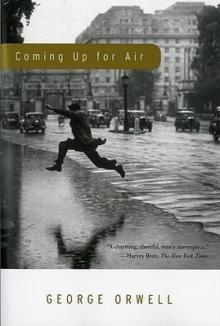 Coming Up for Air
Coming Up for Air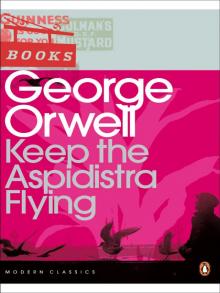 Keep the Aspidistra Flying
Keep the Aspidistra Flying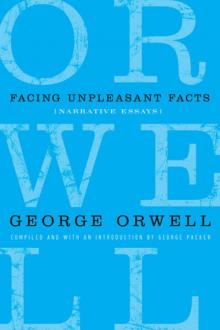 Facing Unpleasant Facts: Narrative Essays
Facing Unpleasant Facts: Narrative Essays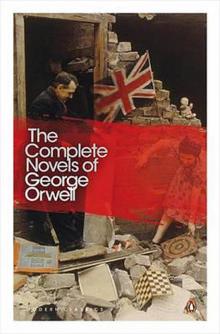 The Complete Novels of George Orwell
The Complete Novels of George Orwell All Art Is Propaganda: Critical Essays
All Art Is Propaganda: Critical Essays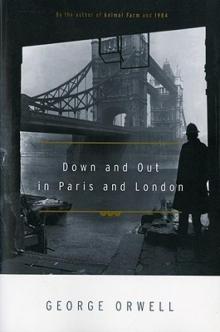 Down and Out in Paris and London
Down and Out in Paris and London Why I Write
Why I Write Nineteen Eighty-Four
Nineteen Eighty-Four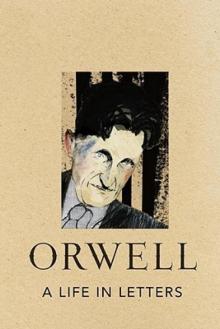 A Life in Letters
A Life in Letters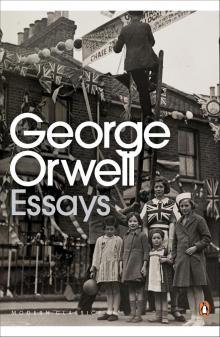 Essays
Essays A Clergyman's Daughter
A Clergyman's Daughter Fifty Orwell Essays
Fifty Orwell Essays Burmese Days
Burmese Days Shooting an Elephant
Shooting an Elephant 1984 (Penguin)
1984 (Penguin) A Collection of Essays
A Collection of Essays 1984
1984 The Complete Novels
The Complete Novels All Art Is Propaganda
All Art Is Propaganda Orwell in Spain
Orwell in Spain Animal Farm: A Fairy Story
Animal Farm: A Fairy Story Animal Farm and 1984
Animal Farm and 1984